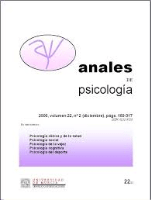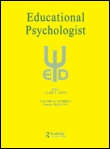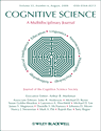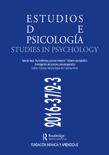
Journal of Intelligence
Scope & Guideline
Championing open access to groundbreaking insights.
Introduction
Aims and Scopes
- Cognitive Assessment and Measurement:
The journal emphasizes the development and validation of cognitive assessments, exploring methodologies such as item response theory and psychometric modeling to enhance the precision and fairness of intelligence testing. - Emotional and Social Intelligence:
Research on emotional intelligence and its impact on social skills, leadership, creativity, and academic performance is a core focus, examining how emotional competencies influence personal and professional outcomes. - Educational Implications of Intelligence:
The journal explores how intelligence theories apply to educational practices, including intervention strategies, the role of metacognition, and the influence of intelligence on learning outcomes. - Interdisciplinary Perspectives on Intelligence:
By integrating insights from psychology, education, neuroscience, and sociology, the journal provides a comprehensive view of intelligence as a dynamic construct influenced by various factors. - Cultural and Contextual Factors in Intelligence:
Research examining the effects of cultural, environmental, and social contexts on intelligence measures and educational practices is highlighted, emphasizing the need for culturally responsive assessments.
Trending and Emerging
- Integration of Technology in Intelligence Assessment:
There is a growing trend towards using technology, including AI and machine learning, to enhance cognitive assessments and educational interventions, reflecting the increasing role of digital tools in measurement. - Emotional and Social Intelligence in Education:
Research focusing on the role of emotional and social intelligence in educational contexts has surged, highlighting its importance in fostering student engagement, resilience, and academic achievement. - Cognitive Flexibility and Adaptability:
Emerging studies emphasize cognitive flexibility as a critical component of intelligence, exploring how adaptability contributes to problem-solving and learning in diverse environments. - Interdisciplinary Approaches to Intelligence:
An increasing number of papers adopt interdisciplinary perspectives, integrating insights from neuroscience, psychology, and education to provide a more holistic understanding of intelligence. - Impact of Socio-Cultural Factors on Intelligence:
Research exploring how socio-cultural factors influence cognitive development and intelligence assessment practices is on the rise, emphasizing the need for culturally sensitive approaches.
Declining or Waning
- Traditional Intelligence Models:
There has been a noticeable decline in papers focusing solely on traditional models of intelligence, such as the g factor, as researchers increasingly explore broader definitions and multidimensional approaches. - Static Intelligence Assessments:
Research centered around static assessments without consideration of dynamic factors, such as adaptability and context, has waned, as the field moves towards more nuanced and flexible assessment methods. - Overemphasis on IQ:
The focus on IQ as a singular measure of intelligence has diminished, as the journal shifts towards recognizing the limitations of IQ tests and advocating for a more comprehensive understanding of intelligence. - Gender and Intelligence Studies:
While gender differences in intelligence have been a longstanding topic, recent publications show a reduced emphasis on this area, possibly reflecting a shift towards more intersectional approaches that consider multiple identity factors.
Similar Journals

Electronic Journal of Research in Educational Psychology
Exploring Insights in Developmental PsychologyElectronic Journal of Research in Educational Psychology, published by UNIV ALMERIA, serves as a vital platform for advancing research in the fields of educational psychology and developmental psychology. With an ISSN of 1699-5880 and an E-ISSN of 1696-2095, this journal has been disseminating scholarly work since its inception in 2003, contributing to an expansive collection of research that highlights current trends, methodologies, and theoretical developments up to 2024. Though it currently holds a Q4 in Developmental and Educational Psychology and a Q3 in Education according to 2023 category quartiles, it is steadily increasing its visibility among the scholarly community, reflected in its Scopus rankings within the 33rd percentile in Social Sciences Education and 21st percentile in Developmental and Educational Psychology. This open-access journal not only enhances accessibility to quality research but also aims to bridge the gap between theory and practice in educational settings. By fostering an environment of collaboration and interdisciplinary dialogue, it stands as an essential resource for researchers, professionals, and students striving to enrich their understanding of educational psychology.

Anales de Psicologia
Exploring diverse perspectives in the realm of psychology.Anales de Psicologia is a distinguished academic journal published by UNIV MURCIA, dedicated to advancing the field of psychology through rigorous research and insightful discourse. With an E-ISSN of 1695-2294 and an open-access model established since 2000, this journal ensures that cutting-edge psychological studies are freely accessible to researchers, practitioners, and students alike. Situated in Spain, at the Edificio Pleiades, Campus de Espinardo in Murcia, Anales de Psicologia covers a broad spectrum of topics within the psychology discipline, contributing to its recognition as a Q3 journal in miscellaneous psychology categories according to recent Scopus rankings. While it holds a commendable rank of 104 out of 216 within general psychology, the journal is committed to fostering an inclusive and diverse academic community, encouraging the submission of innovative studies that push the boundaries of psychological science. Researchers looking for a platform to disseminate their findings will find Anales de Psicologia to be a vital venue for scholarly exchange and intellectual growth.

Acta Neuropsychologica
Empowering Research in Neuropsychology and BeyondActa Neuropsychologica is a notable journal in the fields of Neuropsychology and Applied Psychology, published by the reputable MEDSPORTPRESS PUBLISHING HOUSE since 2005. With an ISSN of 1730-7503 and an E-ISSN of 2084-4298, this journal serves as an essential resource for researchers, professionals, and students interested in advancements in neuropsychological science and its applications. While the journal currently holds a Q4 ranking in both categories for 2023, it continues to provide a platform for cutting-edge research and theoretical discussions, contributing to the understanding of psychological processes and their physiological underpinnings. Situated in Poland, the journal's focus on interdisciplinary approaches offers insights into various therapies, cognitive functions, and neurological assessments, making it a valuable asset for those involved in psychological research. As the field evolves, Acta Neuropsychologica is poised to play a critical role in fostering knowledge dissemination and academic dialogue.

Psychology Society & Education
Connecting Minds: Shaping Education and Society TogetherPsychology Society & Education is a distinguished journal published by EDITORIAL UNIV CORDOBA-UCOPRESS, dedicated to exploring the intersections of psychology, education, and society. With an ISSN of 2171-2085 and an E-ISSN of 1989-709X, this Open Access journal has been providing freely accessible scholarly articles since 2009, ensuring a wide dissemination of knowledge within the academic community. Based in Spain, the journal ranks favorably in its categories, including Q3 in Clinical Psychology and Q3 in Education, illustrating its growing impact in these fields. Offering a platform for rigorous research, reviews, and discussions, Psychology Society & Education invites contributions that advance understanding of psychological principles applied within educational contexts and societal dynamics. Its role in bridging research with practical applications makes it an essential resource for researchers, professionals, and students aiming to contribute to the evolving discourse surrounding psychology and education.

EDUCATIONAL PSYCHOLOGIST
Shaping the Future of Education with Psychological ExpertiseEDUCATIONAL PSYCHOLOGIST, a leading journal published by Routledge Journals, Taylor & Francis Ltd, stands at the forefront of developmental and educational psychology. With an impressive impact factor and recognized as a Q1 journal in its field, it ranks #3 out of 360 in the Scopus category, placing it in the 99th percentile of journal performance. Since its inception in 1963, this esteemed publication has provided a platform for researchers, educators, and practitioners to share innovative studies, theoretical advancements, and practical applications focusing on learning processes and psychological development within educational contexts. Although it does not offer open access, the journal remains a vital resource for those looking to deepen their understanding of educational psychology and its impact on teaching and learning methodologies. Based in the United States, EDUCATIONAL PSYCHOLOGIST is essential reading for anyone committed to advancing knowledge in the field.

Revista de Psicodidactica
Elevating Learning through Empirical EvidenceRevista de Psicodidactica, published by ELSEVIER ESPAÑA, is a leading academic journal dedicated to the fields of Developmental and Educational Psychology. With an impressive impact factor reflecting its high-quality research, the journal has achieved a commendable Q2 ranking in its field for Developmental and Educational Psychology and a Q1 ranking in Education as of 2023. Notably, it holds a significant position in Scopus Ranks, placing in the top 90th percentile in Social Sciences Education and the 84th percentile in Psychology. Launched in 2005, the journal is committed to advancing knowledge in educational practices through empirical research and theoretical frameworks. It provides a vital platform for researchers, educators, and students in Spain and beyond, fostering an open exchange of ideas and innovative approaches to learning and development. Though it is not an open-access publication, it remains a compelling source of contemporary findings for those invested in enhancing educational outcomes.

Journal of Cognitive Education and Psychology
Empowering Educators Through Cognitive Science DiscoveriesWelcome to the Journal of Cognitive Education and Psychology, an esteemed publication under the SPRINGER PUBLISHING CO, based in the United States. With an ISSN of 1945-8959 and an E-ISSN of 1810-7621, this journal serves as a vital platform for the dissemination of research and scholarly discourse in the fields of cognitive education, developmental psychology, and experimental psychology. Despite its Q4 rankings in the 2023 category quartiles across educational and psychological disciplines, the journal has rapidly built a reputation for contributing significant insights to the development and understanding of cognitive processes in educational settings. While operating under a subscription model, the journal aims to provide quality peer-reviewed articles that foster knowledge exchange among researchers, practitioners, and students. As it converges from the years 2017 to 2022, the journal seeks to bridge the gaps between educational psychology theories and practical application, ensuring that the findings and discussions within its pages can directly inform effective educational practices.

COGNITIVE SCIENCE
Illuminating the Complexities of CognitionCOGNITIVE SCIENCE, published by WILEY, is a leading academic journal that delves into the complexities of human cognition through an interdisciplinary lens. With an ISSN of 0364-0213 and an E-ISSN of 1551-6709, this journal has made significant strides in the field since its inception in 1977, ample coverage through to 2024, and a commendable Q1 and Q2 categorization in Experimental and Cognitive Psychology and Cognitive Neuroscience as of 2023. The journal is positioned at the intersection of various disciplines, ranking #65 out of 165 in Experimental and Cognitive Psychology and #58 out of 115 in Cognitive Neuroscience, highlighting its relevance and contribution to advancing knowledge in these areas. Although it does not offer open access, COGNITIVE SCIENCE remains an essential resource for researchers, professionals, and students seeking to explore groundbreaking research and theoretical insights within the vast domain of cognitive science.

International Journal of School & Educational Psychology
Unveiling New Perspectives in School and Educational PsychologyThe International Journal of School & Educational Psychology, published by Taylor & Francis Ltd, is a premier academic journal dedicated to advancing the fields of educational and developmental psychology. With an ISSN of 2168-3603 and E-ISSN 2168-3611, the journal has been a valuable resource since its establishment in 2013, with contributions to the field continuing through 2024. The journal's commitment to rigorous research is evident in its Q2 ranking in both Developmental and Educational Psychology and Education categories in 2023, as well as its notable Scopus rankings, placing it in the top 25% of educational journals. Although it does not offer open access options, the journal provides an essential platform for disseminating high-quality research that enriches the understanding of psychological principles in educational contexts. Targeting researchers, professionals, and students alike, the International Journal of School & Educational Psychology strives to highlight innovative methodologies, practical applications, and theoretical discussions that shape educational practices and foster optimal learning environments.

Studies in Psychology
Empowering researchers to share transformative psychological findings.Studies in Psychology, published by SAGE Publications Inc, is a vital journal in the realm of psychology, recognized for its contributions to the field since its inception in 1980. With an ISSN of 0210-9395 and E-ISSN 1579-3699, it serves as a significant platform for researchers and practitioners seeking to disseminate innovative findings and insights. Currently ranked in the Q3 category for psychology (miscellaneous) and holding a Scopus ranking of 153 out of 216 within general psychology, it ensures a balanced representation of theoretical and empirical studies. The journal aims to foster interdisciplinary collaboration and explore a wide array of psychological themes, thereby enhancing understanding and promoting advancements in psychological science. With open access options available, Studies in Psychology offers readers in-depth access to cutting-edge research, thereby solidifying its essential role in academic and applied settings alike.